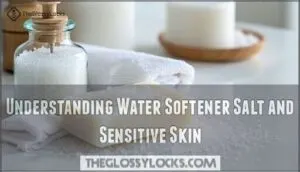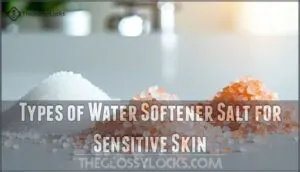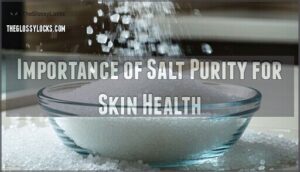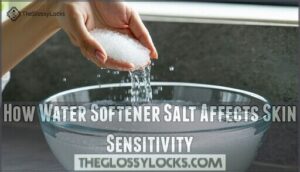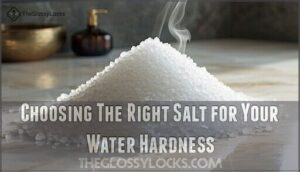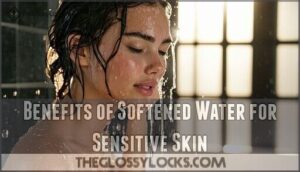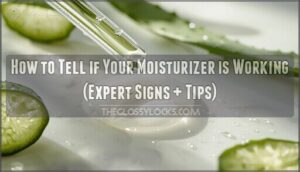This site is supported by our readers. We may earn a commission, at no cost to you, if you purchase through links.

Evaporated salt is extremely pure and dissolves easily, while solar salt is environmentally friendly and milder on skin. For those seeking to reduce sodium intake, potassium chloride is a salt-free alternative.
The purity of your selected salt is critical, as it minimizes residue that can aggravate skin conditions. Consider your water hardness and usage patterns when selecting.
Table Of Contents
- Key Takeaways
- Understanding Water Softener Salt and Sensitive Skin
- Types of Water Softener Salt for Sensitive Skin
- Importance of Salt Purity for Skin Health
- How Water Softener Salt Affects Skin Sensitivity
- Choosing the Right Salt for Your Water Hardness
- Maintenance Tips for Optimal Skin-Friendly Performance
- Benefits of Softened Water for Sensitive Skin
- Frequently Asked Questions (FAQs)
- Can you be allergic to water softener salt?
- Is water softener salt good for your skin?
- Does it matter what brand of salt I use in my water softener?
- Which water softener salt is best for hair?
- What is the best water softener salt for sensitive skin?
- What is good for severe skin sensitivity?
- Which water softener salt is best for sensitive skin & hair?
- Is salt a good water softener?
- Which water softener salt is compatible with a sanitizer?
- Where can I buy sea salt water softener?
- Can water softener salt cause skin allergies?
- How often should I change salt for sensitive skin?
- Is potassium chloride better for eczema-prone skin?
- Do different salt brands affect skin differently?
- Can softened water help with psoriasis symptoms?
- Conclusion
Key Takeaways
- When it comes to sensitive skin, not all salts are created equal! Opt for high-purity options like evaporated or solar salt – they’re the crème de la crème for keeping your skin happy and irritation-free.
- Think of your water softener as a picky eater – feed it the right salt, and it’ll work wonders for your skin. Evaporated salt pellets are like the gourmet meal of the water softening world, dissolving easily and leaving minimal residue.
- Don’t let hard water be the villain in your skincare story! Softened water can be a game-changer for sensitive skin, reducing dryness, redness, and that pesky soap scum that loves to overstay its welcome.
- Remember, maintaining your water softener is like tending to a garden – a little regular care goes a long way. Keep that brine tank clean and topped up with high-quality salt, and your skin will thank you with a radiant, irritation-free glow!
Understanding Water Softener Salt and Sensitive Skin
Regarding sensitive skin, the type of water softener salt you choose can have a significant impact. Evaporated salt, with its high purity and low water-insoluble matter, is often the best choice for improving water softener efficiency and preventing salt bridges that can lead to skin irritation. Solar salt, while more eco-friendly, may have lower solubility and cause some buildup. Potassium chloride, a salt alternative, can also be gentle on sensitive skin by minimizing the sodium content in your softened water.
Ultimately, selecting the right water softener salt boils down to understanding your home’s water hardness and usage needs. Higher-purity options like evaporated salt tend to be more maintenance-friendly, while still protecting your skin’s natural barrier. By choosing wisely, you can enjoy the benefits of softened water without compromising your skin’s health.
Types of Water Softener Salt for Sensitive Skin
Regarding the selection of the most suitable water softener salt for sensitive skin, options such as evaporated salt, solar salt, and potassium chloride are particularly noteworthy. Each type offers varying degrees of purity and effectiveness, allowing you to find the ideal choice for your specific requirements.
Evaporated Salt
Evaporated salt is a top choice for those with sensitive skin due to its high purity. Made through an evaporation process, it guarantees minimal impurities, reducing skin problems. Its uniform granule size ensures even distribution in water softeners, providing consistent results. Plus, its eco-friendly production adds a sustainable touch.
Solar Salt
Solar salt is a fantastic choice for those with sensitive skin. Harvested through solar evaporation, this natural salt is eco-friendly and free from harsh impurities.
- Maintains skin’s pH balance
- Contains beneficial natural minerals
- Effective for moderate water hardness
- Gentle on sensitive skin
Choose solar salt for a skin-friendly water softening experience.
Potassium Chloride
Potassium chloride offers a salt-free alternative that’s gentle on sensitive skin. While slightly pricier, it’s effective for water softening and environmentally friendly. With high availability and longevity, it supports better water quality, reducing skin irritation and potential health effects from sodium-based salts, making it a viable option.
Importance of Salt Purity for Skin Health
When dealing with sensitive skin, the purity of water softener salt becomes critical. Impurities like heavy metals or insoluble materials can exacerbate skin conditions such as eczema or dryness. High-purity salts like those from Morton and Diamond Crystal contain mostly sodium chloride, minimizing potential irritants.
Skin absorbs water and any dissolved substances, so reducing salt impurities can help prevent allergic reactions. For instance, Morton salt pellets are known for their high purity, greatly reducing residues that could cause irritation. Choosing a clean, high-quality salt guarantees that your water softener functions effectively, providing you with water that’s gentler on sensitive skin.
Using pure salts also means fewer contaminants are added to your water, aiding in skin health by preventing additional irritation. Those with sensitive skin should prioritize salt purity to maintain healthy, irritation-free skin in their daily water use, enabling a much more comfortable experience overall.
How Water Softener Salt Affects Skin Sensitivity
Water softener salt can substantially affect skin sensitivity, especially for those with sensitive skin. High-purity water softener salt is crucial for minimizing skin irritation. Impurities in salt can leave behind residue, which might aggravate skin conditions and cause discomfort. Choosing the right salt requires understanding the types available and how they affect your skin.
- Salt Impurities: Low-quality salts may contain contaminants that lead to skin irritation.
- High Purity: Opting for evaporated salt, which has fewer impurities, helps manage sensitive skin better.
- Maintenance Habits: Regularly cleaning the brine tank prevents the buildup of harmful residues that could affect your skin.
- Iron: Some salts are formulated to remove iron; high iron levels in water can worsen skin problems.
In summary, investing in high-purity water softener salt and maintaining the system can lead to healthier, happier skin.
Choosing the Right Salt for Your Water Hardness
Choosing the appropriate water softener salt for your home requires evaluating salt purity and understanding your household’s water consumption. Higher purity salts are essential for reducing maintenance requirements and skin irritation, guaranteeing satisfactory performance for all skin types.
Evaluating Salt Purity
Salt purity impacts skin sensitivity by minimizing salt impurities that can cause irritation. High-purity options like evaporated salt and potassium chloride are best for softening hard water without harmful deposits. Here’s a quick comparison:
| Salt Type | Purity Level | Solubility | Ideal For |
|---|---|---|---|
| Evaporated Salt | Very High | Highly soluble | Extremely hard water |
| Solar Salt | Moderate | Moderately soluble | Hard water |
| Rock Salt | Low | Poorly soluble | Manufacturer-recommended |
| Potassium Chloride | Very High | Highly soluble | Healthier alternative |
Understanding Household Usage
Understanding your household usage is imperative when selecting water softener salt. Match the salt type to your water hardness level and usage patterns:
- Monitor your salt consumption regularly
- Store salt in dry, cool conditions
- Consider frequency considerations
- Factor in solubility differences
- Remember, ion exchange impacts appliance lifespan and rust stains
Maintenance and Upkeep
Maintain your water softener by regularly inspecting your brine tank, ensuring proper salt storage, and cleaning to prevent salt bridges and residue buildup. Use high-purity pellets like Morton Clean and Protect for efficient performance. Testing home water hardness and replacing salt monthly helps maintain ideal skin-friendly conditions in your bathroom fixtures and hot water heater.
Maintenance Tips for Optimal Skin-Friendly Performance
Proper water softener maintenance guarantees you receive exceptional skin-friendly results. To maintain smooth operation and keep your skin feeling great, follow these steps:
- Regularly Check Salt Levels: Establish a habit of checking your salt levels every couple of weeks. Maintaining your brine tank at least half-full helps prevent exhaustion of softened water.
- Assess Salt Purity: Utilize high-purity salts like Morton Pure and Natural or Diamond Crystal to minimize residue and maintenance. Pure salts dissolve more efficiently and reduce the likelihood of buildup.
- Inspect the Brine Tank: Clean your brine tank annually to prevent sediment buildup. This can extend the lifespan of your water softener and ensure the water you use remains gentle on your skin.
- Use Quality Salt Types: For the best results, consider sea salt or block salt if recommended. Morton Clean and Protect Plus Rust Defense is excellent for homes with high iron content.
Regular upkeep guarantees soft water, enhancing skin health.
Benefits of Softened Water for Sensitive Skin
Softened water enhances skin hydration, reducing dryness and flakiness that often accompany hard water. It also minimizes soap residue, which can decrease irritation for those with sensitive skin.
Healthier Skin Hydration
Soft water keeps your skin hydrated, reducing dryness and redness. You’ll notice a difference, especially if you’ve been battling skin sensitivity. Here’s how softened water compares to hard water:
| Aspect | Hard Water | Soft Water |
|---|---|---|
| Hydration | Leaves residue | Absorbs easily |
| Soap Use | More needed | Less required |
| Skin Feel | Tight, itchy | Smooth, supple |
| Maintenance | Frequent | Minimal |
Reduced Skin Irritation
Softened water can greatly reduce skin irritation. By removing mineral deposits that often trigger skin reactions, you’ll notice a decrease in itching, dryness, and redness. This is especially beneficial if you have sensitive skin or existing skin conditions. Water filtration and high-quality salt without additives ensure your skin and hair stay healthy and comfortable.
Minimized Soap Residue
Softened water minimizes soap residue on your skin, promoting better skin health. With fewer minerals, you’ll need less soap, reducing leftover scum. This means your skin won’t absorb excess products, maintaining its natural balance. Improved water quality enhances skin hydration, leaving you with a softer, cleaner feel after bathing or washing your face.
Frequently Asked Questions (FAQs)
Can you be allergic to water softener salt?
Like a fish out of water, you’re unlikely to be allergic to softener salt itself. However, you might react to impurities in lower-quality salts. Opt for high-purity options to minimize skin irritation risks.
Is water softener salt good for your skin?
Water softener salt can benefit your skin by reducing mineral buildup. It helps prevent dryness and irritation caused by hard water. You’ll likely notice softer, smoother skin and may experience less itching or redness after bathing.
Does it matter what brand of salt I use in my water softener?
You’ve just stumbled upon a secret: brand matters! Higher-quality salts, like evaporated or solar options, offer purer results. They’ll keep your softener running smoothly, prevent buildup, and guarantee your skin stays happy. Don’t skimp on salt quality!
Which water softener salt is best for hair?
For healthier hair, choose high-purity water softener salt. Evaporated salt pellets, like Morton Clean and Protect II, are your best bet. They’ll reduce mineral buildup, leaving your locks softer and more manageable after each wash.
What is the best water softener salt for sensitive skin?
Imagine Sarah’s skin irritation disappearing after switching salts. For sensitive skin, opt for high-purity options like Morton Clean and Protect II or Diamond Crystal Bright & Soft. They’ll minimize residue, reducing potential irritants and leaving your skin feeling smoother.
What is good for severe skin sensitivity?
For severe skin sensitivity, you’ll want to use hypoallergenic products and avoid harsh chemicals. Consider fragrance-free moisturizers, gentle cleansers, and natural fabrics. Consult a dermatologist for personalized advice and potential treatments like corticosteroids or immunosuppressants.
Which water softener salt is best for sensitive skin & hair?
Like a gentle caress, high-purity salt pellets soothe your skin and hair. You’ll want Diamond Crystal Bright & Soft or Morton Clean and Protect II. They’re hypoallergenic, reducing irritation and leaving you feeling silky smooth.
Is salt a good water softener?
Yes, salt’s an effective water softener. It works through ion exchange, removing hard minerals like calcium and magnesium. You’ll notice softer water, less scale buildup, and improved appliance efficiency. It’s a tried-and-true solution for many households.
Which water softener salt is compatible with a sanitizer?
You’d be amazed at the compatibility! For sanitizer systems, opt for high-purity evaporated salt pellets. They’ll dissolve easily, preventing buildup and ensuring your system runs smoothly. Morton Clean and Protect II or Diamond Crystal Bright & Soft are excellent choices.
Where can I buy sea salt water softener?
You’ll find sea salt water softener at home improvement stores like Home Depot or Lowe’s. It’s also available online through retailers such as Amazon, Walmart, and specialty water treatment suppliers. Check local hardware stores for convenient options too.
Can water softener salt cause skin allergies?
While it’s rare, water softener salt can potentially cause skin irritation in sensitive individuals. You’re more likely to experience issues from hard water. If you’re concerned, try a salt-free softener or consult a dermatologist for personalized advice.
How often should I change salt for sensitive skin?
You should change your water softener salt every 4-6 weeks for sensitive skin. Monitor salt levels weekly and adjust based on water usage. Using high-purity salt, like evaporated pellets, can help minimize potential skin irritations.
Is potassium chloride better for eczema-prone skin?
You’re in luck! Potassium chloride can be gentler on eczema-prone skin. It doesn’t add sodium to your water, potentially reducing irritation. However, it’s less effective at softening water, so you’ll need to use more.
Do different salt brands affect skin differently?
Different salt brands can affect your skin. Higher-purity salts like evaporated or pellet forms leave less residue, potentially reducing irritation. Potassium chloride might be gentler for sensitive skin, but individual results may vary. Always consult a dermatologist for personalized advice.
Can softened water help with psoriasis symptoms?
You’ll be amazed! Softened water can work wonders for psoriasis. It reduces skin irritation, helps retain moisture, and may alleviate symptoms. While it’s not a cure, you’ll likely notice improved comfort and reduced flare-ups with regular use.
Conclusion
While selecting the optimal water softener salt for sensitive skin may seem intimidating, it’s a key step for your skin’s well-being.
By choosing high-purity options like evaporated or solar salt, you’ll minimize skin irritation and maximize the benefits of softened water.
Remember to evaluate your water hardness and usage patterns when making your decision.
With the right salt and proper maintenance, you’ll enjoy healthier, more hydrated skin and reduced irritation.
Using a gentle cleanser is crucial, and following a nighttime skin care routine for sensitive skin can help you achieve that. Using gentle skincare products with hypoallergenic cleansers Sensitive Skin Solutions can greatly reduce irritation and discomfort. Your sensitive skin will appreciate this important step in your skincare routine.

